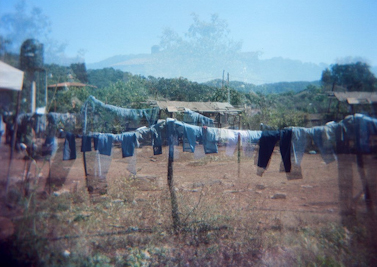She’s on her knees, leaning over the tub,
wringing the grimy wet from an old woolen sweater,
watching the blackened circles of water fold themselves
down, down into the battered bathtub drain
that leads to the cesspool, that leads to the sluggish river.
And just as the whirlpool’s rattle slips into silence,
and her knees have begun to memorize the ridged floor
pressing its patterns and flourishes into her thinning skin,
the phone rings for the second time this morning.
“How you been?” he asks when she picks up,
and she answers, “Oh, not too bad,”
as if they hadn’t solemnly bowed their way
through this dance two hours ago,
while she was emptying last year’s freezer-wizened beans
into the chicken pail, while she was counting
cans of juice and packages of pork chops.
But if she’s already told him about the old camper—
“The one back in the woods, back there
behind my cousin Dave’s place. You know,
the body’s a wreck but Ralph’s figuring
to haul it out so he can salvage the motor,”
or about the dahlias she’s planted—
“Red ones they should of been, and purple
with a little stripe, but every last one came up yellow”—
he won’t care. This is what he wants, really:
stories that don’t matter to anyone;
and relaying her harmless gossip,
she feels her voice deepen and stretch,
as if she’s a cassette tape spooling out at half speed.
She listens to his eager perfunctory replies,
and her eyes prickle with the pity of it,
a pity that hurts her like her knees hurt
when they’re remembering their pattern of sorrow.
“He’s the children’s father” is all she can think to say
to the neighbors who want her to stop picking up the phone.
She won’t go so far as to remind them,
“Oh, don’t he miss those kids,” but that’s the truth.
Why else would he have locked them in that room,
and waved that gun, and howled? Why else,
if he hadn’t understood he’d lost the game,
hadn’t marked himself as dead?
He’s no surprise to her; so when he wails down the line,
“I won’t never see them again!” all she says is
“I got your clean shirts folded here on the bar.”
With a swagger he shouts back, “I ain’t afraid of you!”
and still he’s like the boy he used to be,
the one she recalls at summer Bible school,
pouring Kool-Aid on her little girl
because he couldn’t stop needing the joy
of that freckled outrage.
Anger always did soothe him. It always did.
“I’ll get up to, your place one of these days,”
he stammers now, and “I know you will,”
she says, mild as rain, before she lets herself
hang up the phone, before she sits down
at the vinyl tablecloth and cries a little,
before she takes herself back to her own dirty work.
